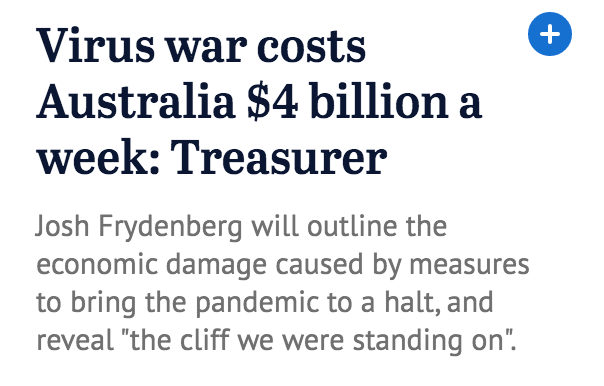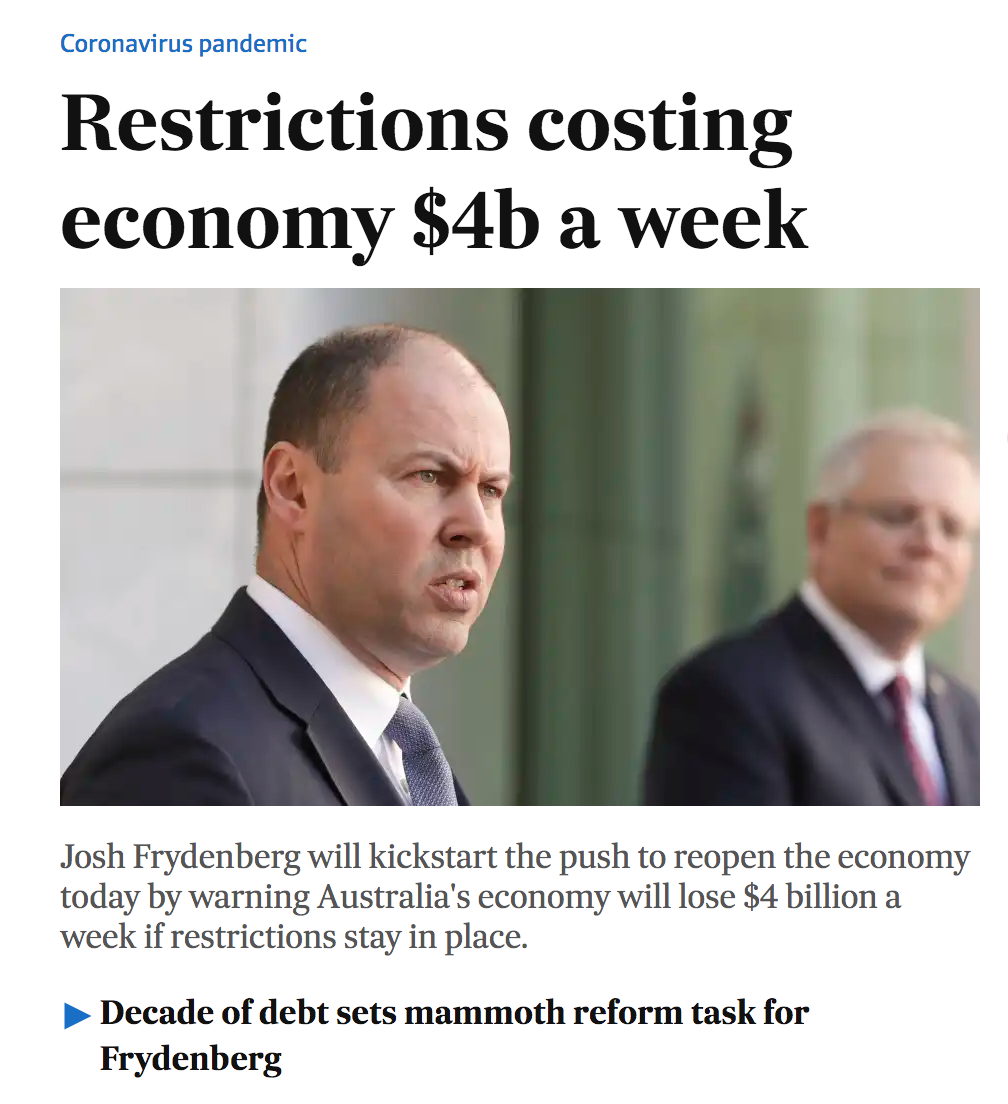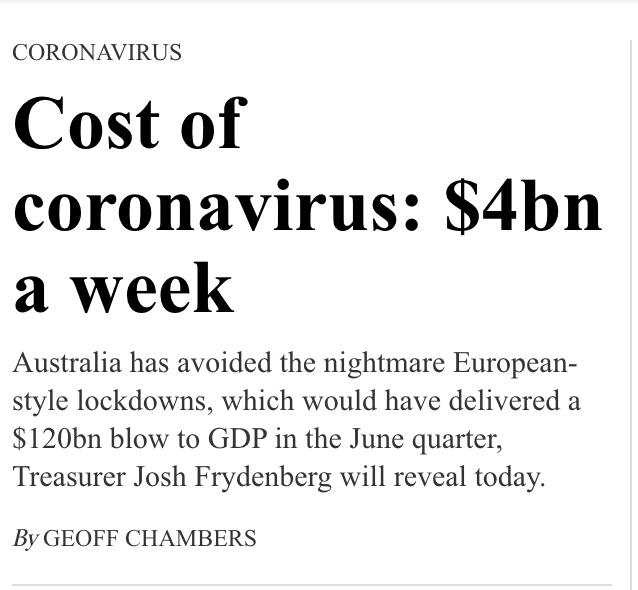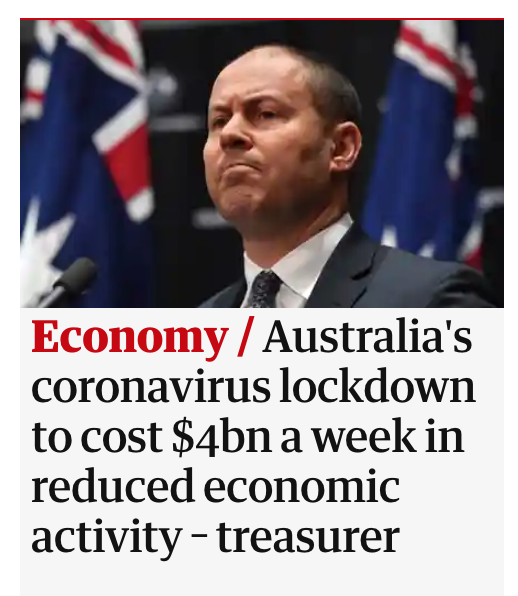The switch has been flicked from saving lives to saving money via a Josh Frydenberg press blitz today. The newspapers as one ran big on the same story. Get ready for “reform”. Michael West reports.
Like Igglepiggle and Upsy Daisy, The Australian and the Financial Review have been trotting out their predictable lines day after day: “lower taxes are great Igglepiggle!” … “Yes, and industrial relations reform too, Upsy Daisy!”
Amid the blanket coronavirus coverage, which has kept everybody suitably scared and malleable, the financial press has run the Government’s narrative to a tee. Predictable as children’s TV show “In the Night Garden”, media consumers are being lulled sweetly with the proposition that lower taxes for big business and lower wages for workers are the economic solutions to the coronavirus woes.
It is also straight out of the big business lobby script. Business Council of Australia chief Jennifer Westacott has been bobbing up everywhere, making sure this crisis does not go to waste.
Enter Ninky Nonk and the Tombliboos
This morning, the rest of the mainstream media sprung onto the Night Garden set. In the media’s own digital “night garden” the night editors all pressed the button on their stories around midnight last night. Presto! This morning, AFR, The Age, SMH, The Guardian and The Australian all had versions of precisely the same story.
Treasury to reveal today the virus was costing $4 billion a week! Today, the narrative – no doubt manicured by the army of PR people in the offices of Josh Frydenberg and Scott Morrison – smoothly transitioned from saving lives to saving money.
AFRIn the SMH, the headline ran: “Virus war costs Australia $4 billion a week: Treasurer.
And the stand-first to the story: “Josh Frydenberg will outline the economic damage caused by measures to bring the pandemic to a halt, and reveal ‘the cliff we were standing on’.”
Cliffs, wars, pandemics. This is the perfect setting for big business “reform”. The audience may be tired and scared but fear not, produced and directed by the business lobby and the Liberal Party, Igglepiggle and Upsy Daisy have the answer! Lower taxes and IR reform!
The script is simple yet powerful. Australia’s economy was strong before the virus. The virus is devastating the economy, we have to move fast now to fix it.
Holes in the script
The fallacy in this narrative of strong performance then virus victimhood is that Australia’s economy had been underperforming rival countries for years and inequality has been on the rise. The policies of trickle-down economics, espoused by successive administrations, have not worked.
And now, big business is likely to emerge from the crisis even more dominant. They might not be paying dividends to their shareholders this year but their donations to the major parties are surely paying a handsome yield.
In defence of Josh Frydenberg, he happens to be treasurer during the heaviest economic shock since the Great Depression. Further, as the chart above shows, he inherited a hospital pass from the previous treasurer Scott Morrison. That hospital pass is evident in the latest MWI below.
The bad news is that the MWI has proven somewhat predictive in its first year of charting the Australian economy – as well as reflective of where we have been. Further, it does not include the present carnage. June Quarter GDP won’t be out till early September and the damage to growth will persist way past that.
How does the index work? We took the Government’s election pitch on Growth (in GDP) and gave it the greatest weight. We blended in the RBA’s concerns with the CPI and interest rates (bond yields) and gave them less weight. We smoothed the numbers because they only come out quarterly and added in the currency.
All these numbers are were down pre-virus. These elements give us 75% of the MWI. The rest reflects market sentiment and some data derived daily.
At lunchtime, the Treasurer is scheduled to address the National Press Club to deliver to the Canberra press gallery the briefing which his office, or associates, leaked last night. The press will hear it again, having already written it too, then reread it, albeit this time over lunch.
This is not a condemnation of the politicians and journalists in the bubble, who are all players at the top of their game in politics and corporate media. It is simply the way the Canberra bubble works. Both are captive to the other.
Consent has been fostered in The Australian and the Financial Review for “reform” over the past three weeks, meaning tax cuts and workforce deregulation. Overnight, the switch has been flicked from virus to economy via a broader press campaign. TV and radio are next.
However, the neo-liberal prescriptions for growth and economic management have allowed Australia to fall behind its peers, indeed be overtaken by many countries which are not even its peers. There are many reasons for this, and just as many things to do to fix it. But the solution is not business tax cuts and “IR reform”.
Business taxes have been coming down for years, from as high as 70 per cent, and those corporations hit by the virus won’t pay tax for years anyway. Tax losses. Dozens of the world’s largest companies don’t pay tax here anyway.
On IR reform, we already have the gig economy. Topping that, the JobKeeper scheme has allowed businesses to shed workers without entitlements or pay-outs, and taxpayers picking up the tab. It has saved them billions and given them the option of rehiring or not.
JobKeeper v JobSeeker: do Australians fill out the form for Treasurer Josh Frydenberg?
Michael West established Michael West Media in 2016 to focus on journalism of high public interest, particularly the rising power of corporations over democracy. West was formerly a journalist and editor with Fairfax newspapers, a columnist for News Corp and even, once, a stockbroker.





